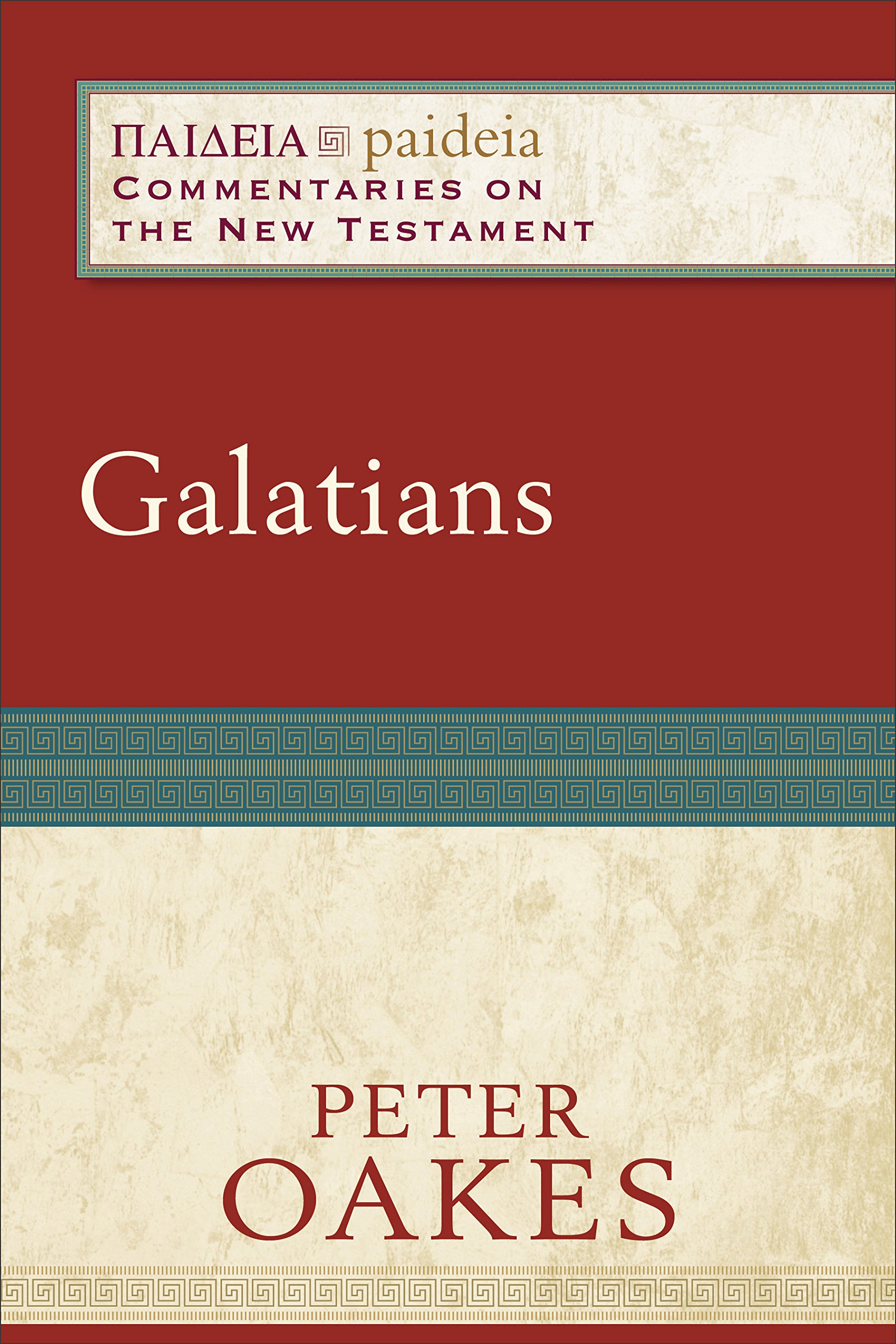 Galatians (Paideia Commentaries on the New Testament), by Peter Oakes (Baker Academic, 2015).
Galatians (Paideia Commentaries on the New Testament), by Peter Oakes (Baker Academic, 2015).
This Galatians commentary is concise, well-informed, accessible, and obviously filled with an immense amount of research and thought – not only thought about Galatians’ theology, but also about methodology. Peter Oakes uses knowledge from various disciplines, such as archaeology, sociology, linguistics, and historical background to enlighten our reading of Galatians.
For example, he discusses archaeological evidence related to Galatians, especially as it pertains to house churches, to help us understand what a typical Pauline church would have looked like (11-14). Also in the introduction he provides some linguistic information you won’t typically find in a commentary. While discussing the form and style of the letter, he provides a chart of the most frequently used lexical groups in Galatians and draws some conclusions about how we should read the letter (5-7). Such an analysis is an insightful use of discourse analysis that more commentators should make use of. Although, as I’m sure Dr. Oakes is aware, one cannot confuse lexical information for theological or conceptual information, which may also dominate the letter even if specific lexemes are not used frequently. Oakes also interacts responsibly with Betz’s rhetorical outline of Galatians, appropriating much of his insight but not swallowing Betz’s assumption of Paul using Greco-Roman rhetoric wholesale.
The commentary proper is geared more toward pastors and students than scholars, in accord with the Paideia series. There is not a great deal of secondary references and there are frequent isolated boxes on various pages that give background information on topics under discussion. Some of these are quite helpful, for example when they provide primary source quotations from Jewish or Greco-Roman sources. Rather than noting something like “Seneca says how the entire world was under Nero’s rule,” he provides a six-line quotation from Seneca to let the reader see for himself or herself what Seneca actually says. The result of all this is a text that reads smoothly and focuses on the text itself, with helpful aids for those who want to see some of the relevant primary evidence for themselves.
If Oakes interacts more often with some scholars than others, it is definitely Martyn and de Boer and their apocalyptic reading of Paul. But his interaction is not as expansive as some may wish. He is generally content to explain various views, especially of Martyn or de Boer, and then leave his ultimate decision a bit ambivalent or tentative. I was hoping for a bit more explicit agreement or critique of the apocalyptic reading of Paul, but perhaps Oakes was trying to navigate the topic based on his audience and did not think extensive interaction with these views would be fruitful for his readers.
At the end of each section in the commentary, Oakes provides discussion of theological issues. These are issues of theological importance that arise from the exegesis of each section, and he does a fairly good job of extending the text to apply to our own day in some way. These theological comments could be used profitably for pastors preparing sermons and need help with application, or with those preparing Bible studies and need some talking points.
I’m a bit torn on who to recommend this commentary to. On the one hand, Oakes clearly has a firm grasp on the academic issues involved in Galatians, so the scholar could benefit in some way, but the exposition is not deep enough, nor the critique of opposing positions sharp enough, to be of great benefit. For the pastor, the exposition is concise, clear, and helpful, but sometimes Oakes leaves decisions too open-ended without coming down on a firm stance for how to translate (or interpret) certain clauses. Without firm, strong, convicted arguments, pastors may find the exposition a bit too unhelpful as they try to make their decisions. Yet the theological comments at the end are quite helpful for preparing sermons. This commentary may be best for students who need accessible introductions to various takes on Paul’s theology while using a resource that is similar to being taught in the classroom.
If I were to recommend this commentary to anyone, I’d recommend it to current masters or PhD students who want to get a better grasp on Paul’s theology in a concise commentary while gleaning some applicational insights from his “theological issues” section.
New @bakeracademic Gal commentary great for grasping views on Paul's theology in Galatians Click To TweetIf you’re interested in other Galatians resources, we recently posted a review of the Baylor Handbook on the Greek Text of Galatians by David A. deSilva as well as a review of Galatians and Christian Theology, ed. Elliot, Hafemann, and Wright.
